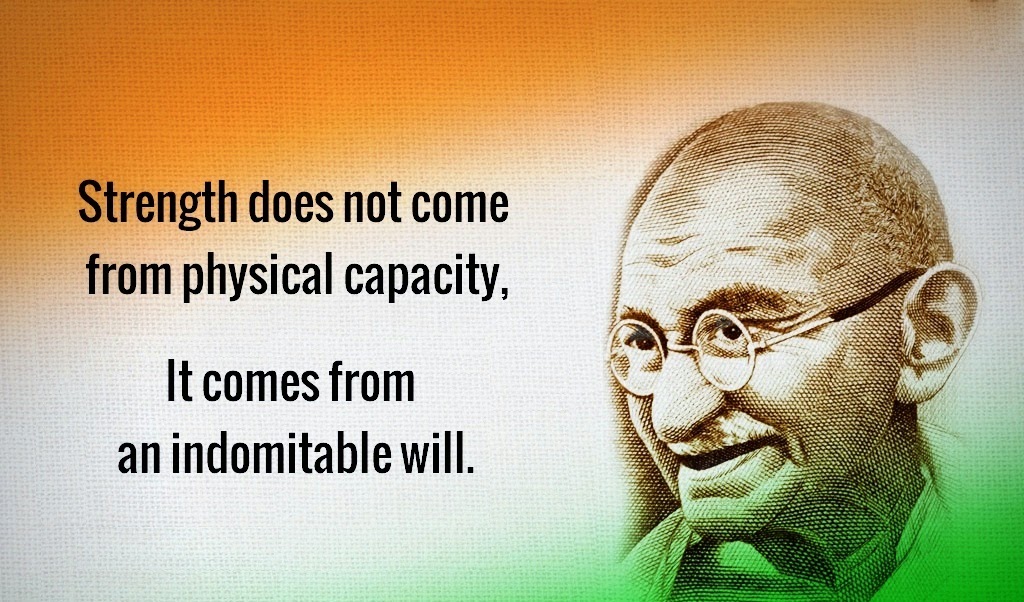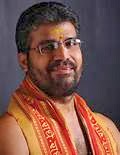The Gospel Of Brahmacharya
1. Self-restraint :
Human society is a ceaseless growth, an unfoldment in terms of spirituality. If so, it must be based on ever-increasing restraint upon the demands of the flesh. Thus, marriage must be considered to be a sacrament imposing discipline upon the partners, restricting them to the physical union only among themselves and for the purpose only of procreation when both the partners desire and the prepared for it.
What chiefly distinguishes man from the beast is that man from his age of discretion begins to practice a life of continual self-restraint. God has enabled man to distinguish between his sister, his, mother, his daughter and his wife.
2. Need for Brahmacharya :
A large part of the miseries of today can be avoided if we look at the relations between the sexes in a healthy and pure light, and regard ourselves as trustees for the moral welfare of the future generations.
Life without Brahmacharyaappears to me to be insipid and znimal-like. The brute by nature knows to self-restraint. Man is man because he is capable of, and only in so far as he exercises, self-restraint. What formerly appeared to me to be extravagant praise of Brahmacharya in our religious books seems now, with increasing clearness every day, to be absolutely proper and founded on experience.
I hold that a life of perfect continence in thought, speech and action is necessary for reaching spiritual perfection. And a nation that does not possess such men is poorer for the want.
3. Faith in God :
I must confess that the observance of the law of continence is impossible without a living faith in God, which is living Truth. It is the fashion nowadays to dismiss God altogether and insist on the possibility of reaching the highest kind of life without the necessity of a living faith in a living God. I must confess my inability to drive the truth of the law home to those who have no faith in and no need for a Power infinitely higher than themselves. My own experience has led me to the knowledge that fullest life is impossible without an immovable belief in a living law in obedience to which the whole universe moves.
The laving force, which we call God, can… be found if we know and follow His law leading to the discovery of Him in us. But it is self-evident that to find out God's law requires far harder labour. The law may, in one word, be termed Brahmacharya. The straight way to cultivate Brahmacharya is Ramanama.
4. Proper Meaning :
The full and proper meaning of Brahmacharya is search of Brahman. Brahman pervades every being and can therefore be searched by diving into and realizing the inner self. This realization is impossible without complete control of the senses. Brahmacharyathus means control in thought, word and action, of all the senses at all times and in all places.
A man or woman completely practicing Brahmacharya is absolutely free from passion. Such a one therefore lives high unto God, is Godlike. I have no doubt that it is possible to practice such Brahmacharya in thought, word and action to the fullest extent.
What is Brahmacharya?It is the way of life which leads us to Brahma (God). It includes full control over the process of reproduction. The control must be in thought, word and deed. If the thought is not under control, the other two have no value. There is a saying in Hindustani: "He whose heart is pure has the all-purifying waters of the Ganga in his house." For one whose thought is under control the other is mere child's play. The Brahmachari of my conception will be healthy and will easily live long. He will not even suffer from so much as a headache. Mental and physical work will not cause fatigue. He is ever bright, never slothful. Outward neatness will be an exact reflection of the inner. He will exhibit all the attributes of the steadfast one described in the Gita. It need cause no worry if not one person is met with answering the description.
Is it strange that one who is able completely to conserve and sublimate the vital fluid which has the potentiality of creating human beings should exhibit all the attributes described above? Who can measure the creative strength of such sublimation, one drop of which has the potentiality of bringing into being a human life?
5. Definition :
So long as thought is not under complete control of the will, Brahmacharya in its fullness is absent. Involuntary thought is an affection of the mind; and curbing of thought, therefore, means curbing of the mind which is more difficult to curb than the wind. Nevertheless the existence of God within makes even control of the mind possible. Let no one think that it is impossible because it is difficult. It is the highest goal, and it is no wonder that the highest effort should be necessary to attain it.
6. The Mind :
Brahmacharya, like all other observances, must be observed in thought, word and deed. We are told in the Gita, and experience will corroborate the statement, that the foolish man, who appears to control his body, but is nursing evil thoughts in his mind, makes a vain effort. It may be harmful to suppress the body, if the mind is at the same time allowed to go astray. Where the mind wanders, the body must follow sooner or later….
…It is one thing to allow the mind to harbour impure thoughts; it is a different thing altogether if it strays among them in spite of ourselves. Victory will be ours in the end, if we non-co-operate with the mind in its evil wanderings.
7. Inner Condition :
Brahmacharya is a mental condition. The outward behavior of a man is at once the sign and proof of the inner state. He who has killed the sexual urge in him will never be guilty of it in any shape or form. However attractive a woman may be, her attraction will produce no effect on the man without the urge. The same rule applies to woman...
Brahmacharya is not a virtue that can be cultivated by outward restraints. He who runs away from a necessary contact with a woman does not understand the full meaning of <>i>brahmacharya……
The true brahmachari will shun false restraints. He must create his own fences according to his limitations, breaking them down when he feels that they are unnecessary. The first thing is to know what true brahmacharya is, then to realize its value and lastly to try to cultivate this priceless virtue . I hold that true service of the country demands this observance.
8. Control of Sense :
Mere control of animal passion has been thought to be tantamount to observing brahmacharya.I feel that this conception is incomplete and wrong. Brahmacharya means control of all the organ of sense. He who attempts to control only one organ and allows all others free play is bound to find his effort futile.
To hear suggestive stories with the ears, to see suggestive sights with the eyes, to taste stimulating food with the tongue, to touch exciting things with the hands, and then at the same time, expect to control the only remaining organ is like putting one’s hand in the fire, and expecting to escape being burnt.He, therefore, who is resolved to control the one must be likewise determined to control the rest.
I have always felt that much harm has been done by the narrow definition of brahmacharya. If we practise simultaneous control in all directions, the attempt will be scientific and possible of success. Perhaps the palate is the chief sinner.
9. The Sthitaprajna :
What ….are the characteristics of a Sthitaprajna?He is one who withdraws his senses from the objects of the senses behind the shield of the spirit, as a tortorise does its limbs under its shell. A man whose wisdom is not steady is liable to be betrayed into anger, evil thoughts or abuse. On the contrary, the man with steady wisdom will remain equally unaffected by adulation or abuse. He will realize that abuse fouls only the tongue that utters it, never the person against whom it is hurled. A man of steady wisdom will, therefore, never wish ill to anyone, but will pray even for his enemy with his last breath.
10. My Brahmacharya :
For me the observance of even bodily brahmacharya has been full of difficulties. Today I may that I feel myself fairly safe, but I have yet to achieve complete mastery over thought, which is so essential. Not that the will or effort is lacking, but it is yet a problem to me where from undesirable thoughts spring their insidious invasions.
I have no doubt that there is a key to lock out undesirable thoughts, but every one has to find it out for himself. Saints and seers have left their experiences for us, but they have given us no infallible and universal prescription. For, perfection or freedom from error comes only from grace, and so seekers after God have left us mantrassuch as Ramanama, hallowed by their own austerities and charged with their purity.
Without an unreserved surrender to His grace, complete mastery over thought is impossible. This is the teaching of every great book of religion, and I am realizing the truth of it every moment of my striving after that perfect brahmachadrya.
I have practised brahmacharya for over thirty years with considerable success though living in the midst of activities. After the decision to lead the life of a brahmachari, there was little change in my outward practice, except with my wife…..
My brahmacharya was not derived from books. I evolved my own rules for my guidance and that of those who, at my invitation, had joined me in the experiment. If I have not followed the prescribed restrictions, much less have I accepted the description found even in religious literature of woman as the source of all evil and temptations. Owing as I do all the good there may be in me to my mother, I have looked upon woman, never as an object for satisfaction of sexual desire, but always with the veneration due to my own mother. Man is the tempter and aggressor. It is not woman whose touch defiles man, but he is often himself too impure to touch her ……
I am experimenting. I have never claimed to have been a perfect brahmachari of my definition. I have not acquired that control over my thoughts that I need for my researches in non–violence is to be contagious and infectious, I must acquire greater control over my thoughts.
From that day when I began brahmacharya, our freedom began. My wife became a free woman, free from my authority as her lord and master, and I became free from the slavery to my own appetite, which she had to satisfy. No other woman had any attraction for me in the same sense that my wife had. I was too loyal to her as husband and too loyal to the vow I had taken before my mother to be slave to any other woman. But the manner in which my brahmacharya came to me irresistibly drew me to woman as the mother of man. She became too sacred for sexual love. And so every woman at once became sister or daughter to me.
If I were sexually attracted towards women, I have courage enough, even at this time of life, to become a polygamist. I do not believe in free love –secret or open, Free, open love I have looked upon as dog’s love, secret love is, besides, cowardly.
Mahatma Gandhi.





Comments